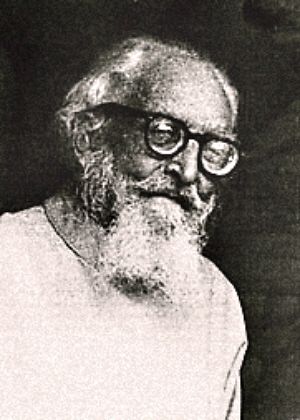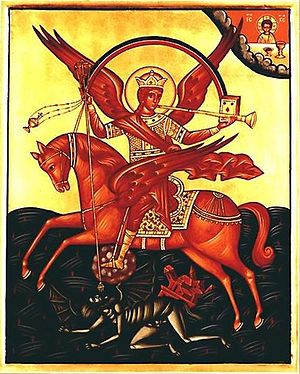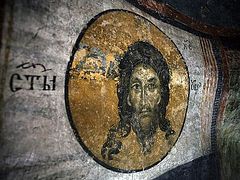Yesterday and today we are presenting a series of four articles on the heresy of Chiliasm, or Millennialsm—that is, that Christ will have a literal, earthly kingdom lasting for 1,000 years at the end of time. This belief, popular amongst many Protestants today, arises from a misinterpretation of Scripture, and our saints and holy elders hold for us the key to properly understanding Scripture, and the end times, as far as it is given to us to know.
This third article is an excerpt from Orthodox Dogmatic Theology by Fr. Michael Pomazansky (St. Herman of Alaska Press).
See the first article in the series by Elder Cleopa (Ilie) of Romania.
See the second article in the series by Bishop Alexander (Mileant).
* * *
Very widespread at the present time is the teaching about a thousand-year kingdom of Christ on earth before the universal or last judgment; this teaching is known by the name of "chiliasm" (from the Greek chiliasmos, a thousand years). The essence of this teaching is as follows: Long before the end of the world, Christ will come again to earth to overcome Antichrist and resurrect only the righteous, to establish a new kingdom on earth in which the righteous, as a reward for their struggles and sufferings, will reign together with Him for the course of one thousand years, taking enjoyment of all the good things of temporal life. After this there will follow a second, universal resurrection of the dead, the universal judgment, and the universal and eternal giving of rewards. Such are the ideas of the chiliasts. The defenders of this teaching found themselves on the visions of the seer of mysteries (John the Theologian) in the twentieth chapter of the Apocalypse. There it is said that an angel descended from heaven and bound satan for a thousand years, and that the souls of those beheaded for the witness of Jesus and for the word of God came to life and reigned with Christ for a thousand years. This is the first resurrection (Apoc. 20:5). And when the thousand years are expired, Satan shall be loosed out of his prison, and shall go out to deceive the nations (Apoc. 20:7-8). Soon there follows the judgment of the devil and of those who were deceived by him. The dead will be raised up and judged according to their deeds. And whosoever was not found written in the book of life was cast into the lake of fire ... This is the second death (Apoc. 20:15, 14). Upon those who have been resurrected in the first resurrection, however, the second death will have no power.
Chiliastic views were spread in antiquity chiefly among heretics. However, they are also to be encountered in certain ancient Christian writers of the universal Church (for example Papias of Hierapolis, Justin the Matryr, Irenaeus of Lyons). In more recent times these views were resurrected in the Protestant sects; and finally, we see attempts in certain modernist theologians of our times to introduce chiliastic ideas also into Orthodox theological thought.
As has been indicated, in this teaching there are supposed to be two future judgments, one for the resurrected righteous ones, and then a second, universal one; there are two future resurrections, first one of the righteous, and then another of sinners; there are two future comings of the Saviour in glory; there is a future, purely earthly—even though blessed—reign of Christ with the righteous ones as a definite historical epoch. Formally, this teaching is based on an incorrect understanding of the expression "the first resurrection;" while inwardly, its cause is rooted in the loss, among the masses of contemporary sectarianism, of faith in life after death, in the blessedness of the righteous in heaven (with whom they have no communion in prayer); and another cause, in certain sects, is to be found in utopian dreams for society hidden behind religious ideas and inserted into the mysterious images of the Apocalypse.
 Fr. Michael Pomazansky
Fr. Michael Pomazansky
The "second death" is the judgment of sinners at the Last Judgment. It will not touch those who have part in the first resurrection (Apoc. 20:6); this means that those who are spiritually reborn in Christ and purified by the grace of God in the Church will not be subjected to judgment, but will enter into the blessed life of the Kingdom of Christ.
If it was at one time possible to express chiliastic ideas as private opinions, this was only until the Ecumenical Church expressed its judgment about this. But when the Second Ecumenical Council (381), in condemning all the errors of the heretic Apollinarius, condemned also his teaching of the thousand-year reign of Christ and introduced into the very Symbol of Faith the words concerning Christ: And His Kingdom will have no end—it became no longer permissible at all for an Orthodox Christian to hold these opinions (One of the leading Fathers of the early Church who combated the heresy of chiliasm was Blessed Augustine; see his discussion of this in The City of God, 20, 7-9, pp. 718-728. He connects the "binding" of the devil for a thousand years (Apoc. 20:2) with the "binding" of the "strong man" in Mark 3:27 (see also John 12:31, the words of Christ just before His Passion: Now shall the prince of this world be cast out, and states that "the binding of the devil is his being prevented from the exercise of his whole power to seduce men." Orthodox Christians who have experienced the life of grace in the Church can well understand what Protestants cannot: that the "thousand years" (the whole period) of Christ’s reign with His saints and the limited power of the devil is now.
A related error, widespread among contemporary Protestants, is that of the "rapture." Unheard of before the nineteenth century, this belief has it that during the "great tribulation" near the end of the world (either before or after the "millennium," according to various versions), true Christians will be "raptured" into the air to escape the sufferings of those who remain on earth. It is based on a misinterpretation of 1 Thess. 4:17, which teaches that at the very end of the world believers will be "caught up in the clouds," together with the resurrected dead, "to meet the Lord" Who is coming for judgment and the opening of the eternal Kingdom of Heaven. The Scripture is quite clear that even the elect will suffer on earth during the "tribulation" period, and that for their sake this period will be shortened (Matt. 24:21-22).
* * *
See the fourth article in the series by Fr. John Whiteford.





I really loved the article :)